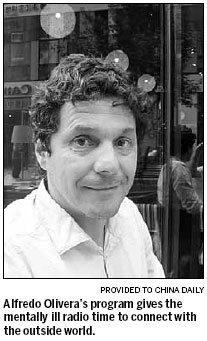Giving the mentally ill a voice - on radio
Updated: 2013-10-27 08:11
By Mike Peters(China Daily)
|
|||||||
Imagine going into a mental hospital, setting up a table with a microphone and letting the inmates have their say - on the radio.
Sound crazy? That's not a word that scares Alfredo Olivera, a former volunteer social worker in Buenos Aires who founded La Colifata, or Crazy Radio, which became a pop-culture sensation there in the 1990s.
Olivera, who has worked to replicate the program in about a dozen cities in Europe, Latin America and Canada, was in Beijing recently to share his ideas.
Talking with students studying Spanish at Beijing Capital Normal University, Olivera found "a lot of curiosity regarding insanity" among people who hadn't given it much thought before.
He knows that the mentally ill are "set aside" in China - out of sight and out of mind. But that is a common response to societies everywhere, he says. That isolation is what inspired Crazy Radio in the first place.
"We also talked about how there is not always a clear delineation between 'crazy' and 'normal' - or 'crazy' and 'genius' - and how the radio shows try to connect 'the two planets' with call-ins and other feedback."
The embassy of Argentina arranged programs for Olivera at several cultural venues during his visit. But it was hearing students eager to talk about what insanity is - and how to see through it to the humans trapped in a different reality - that got him most excited about his China visit.
He did not have the chance to share his ideas with health or social-service agencies here, but he is sure that a Crazy Radio of China's own could be a positive and vibrant force in society.

"First, we create a therapy for patients," Olivera says.
"By reconnecting them with the outside world, many who just didn't talk in the hospital recover their speech.
"Second, listeners can experience the boundaries of sanity and insanity. We use media to strip the stigma from insanity and also to ease the mental suffering of people who are hospitalized."
Olivera now runs Radio Citron, a similar program in France, but Crazy Radio wasn't his original mission in life.
"I was 24 years old, teaching people to read in poor neighborhoods," he says.
It wasn't just a matter of showing up with a prepared lesson - there were no tables, no chairs, not even a room. He had to find volunteers to offer their houses and furniture so he could bring students together.
Olivera formed a street-art group with some of those students, who met occasionally to watch films together.
"One day, we saw a documentary that was filmed in a mental hospital," he says.
"I was incredibly moved by that."
He started volunteering at the largest psychiatric hospital in Buenos Aires on Saturdays.
"I kept going for several weeks, not really knowing how I could help," he remembers.
"But I felt the tremendous power of isolation."
A radio-station producer gave him a once-a-week call-in show to talk about the experience of working in the hospital.
Then someone said it would be better to put patients on.
"So I went back to the hospital with a recorder," he says, grinning.
"I asked: 'Would you like to communicate with the outside world?'"
The patients were intrigued.
"What they said was very profound and interesting," he remembers.
"I was very surprised."
The discussion ranged from the role of women in modern society to the biblical, including how woman was said to be created from Adam's rib.
"So they owe us a rib!" Olivera remembers one guy joking insistently.
After editing about six hours of talk into topical segments, Olivera put Crazy Radio on the air. The call-in phone lines lit up.
Olivera has received several prizes and his projects have attracted the support of the Coca-Cola Company, the Franco-Spanish singer Manu Chao and Francis Ford Coppola, who set his 2009 film Tetro in the radio station La Colifata.
"We can break through the stigma and the stereotypes by doing something as simple as talking on the radio," Olivera says.
"Expanding the ability to communicate gives the patients and the listeners more perspective on life. We can all make more sense of our situations by talking."
michaelpeters@chinadaily.com.cn
(China Daily 10/27/2013 page5)